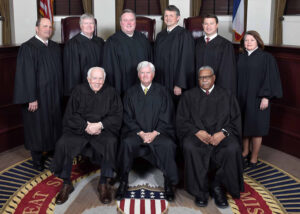The question for the Mississippi Supreme Court was whether the amount of damages due an injured employee for her attorney’s negligence should include the workers’ compensation benefits she missed out on.
The answer, the court decided last week, is “yes,” even though the extent and duration of the injury was never adjudicated.
“After review, we find the Court of Appeals missed the impact of the law firm’s neglect on Chandler’s ability not only to file but also to prove her workers’ compensation claim,” Justice James Maxwell wrote for the majority in Turner & Associates vs. Lori Chandler. “When this practical reality is factored in, we find the trial court’s award is sufficiently supported by the evidence and should be affirmed.”
The case involved the law firm of Bennie Turner, in West Point, Mississippi. In addition to being an attorney, Turner was a well-known television broadcaster and one of only a dozen African-American state senators in the Legislature. He served in the chamber for 20 years until his death in 2012.

The Chandler case began in March 2008, when Chandler was working at Cooper Tire Co. in northern Mississippi. She was driving a forklift when another forklift collided with her, sending her to the emergency room the next day. The court opinion did not convey the extent or nature of her injuries, but said they were enough that her doctor placed her on sedentary work restrictions.
Cooper terminated the woman three days later, saying the company didn’t need help with secretarial work, the court opinion explained.
Chandler began physical therapy, but discontinued it after two months when she discovered she was pregnant. In August that year, she decided she needed legal representation and sought out the Turner firm. She testified that she met with Turner’s daughter, attorney Angela Lairy, although Lairy later denied meeting with the injured worker.
For reasons that were not explained in the court opinion, the firm failed to file Chandler’s workers’ compensation claim within the two-year statute of limitations, dooming any chance at benefits, the Supreme Court noted. Seeing no action on her case, Chandler in 2011 contacted Turner’s other daughter, a case manager at the firm named Carolyn Karriem.
Instead of informing Chandler of the mistake in not filing the claim, Karriem falsely told Chandler that the firm was negotiating a settlement with Cooper Tire.
“Not only was this false, but Karriem actually conveyed a fake settlement offer of $25,000,” Justice Maxwell wrote in the opinion. Chandler rejected the “offer,” and over the next year, Karriem continued to concoct false statements about settlement offers of increasing amounts. About this time, Turner died and Lairy took over the practice, the court said.
Shortly after that, Karriem said that Cooper Tire had agreed to a $100,000 settlement. She sent Chandler a fake settlement agreement, which she signed.
After six months passed with no check in the mail, though, Chandler began asking questions. She soon discovered that there was no settlement offer and that a claim had never been filed. She hired a new law firm and sued the Turner firm, along with Lairy and Karriem, for legal malpractice.
The trial court judge awarded Chandler $50,000 for compensatory damages, based on her lawyer’s calculation that she was out of work for two years and should have seen two-thirds of her wages for the temporary total disability. The judge also granted $100,000 in punitive damages against Karriem.

On appeal, the Mississippi Court of Appeal threw out the compensatory damages, noting that Chandler had failed to support her injury claims with substantial medical evidence.
The high court found that the appeals court had erred, and restored the $50,000 in compensatory damages, bringing the total award in the case back to $150,000.
“Were this a straight-up workers’ compensation case, we might agree with the Court of Appeals,” Justice Maxwell wrote. “But this is not a workers’ compensation case. This is a legal malpractice case. And it is at least partly due to the law firm’s negligence—which is not in dispute—that Chandler was unable to obtain the required medical proof to be compensated by the Workers’ Compensation Commission, had her claim been properly filed.”
The high court noted that Chandler explained that after her child was born in late 2008, she was unable to keep up with treatment for her forklift injury. Her doctor also gave her “the runaround,” urging her to go through a workers’ comp attorney to finalize the claim, she testified.
“In other words, through Turner & Associates’ undisputed negligence, Chandler lost not only the ability to file a workers’ compensation claim but also the ability to prove her workers’ compensation claim through sufficient medical evidence,” the Supreme Court said.
The court remanded one question to the trial court – whether Lairy, now Angela Turner Ford, is jointly liable for the $50,000 compensatory damages.
Associate Justice Josiah Coleman dissented in the opinion, arguing that Chandler had never proven that her comp claim had value.
Attorneys in the case could not be reached for comment Monday.
Topics Mississippi
Was this article valuable?
Here are more articles you may enjoy.



 Beazley Agrees to Zurich’s Sweetened £8 Billion Takeover Bid
Beazley Agrees to Zurich’s Sweetened £8 Billion Takeover Bid  After Falling 6% in 2025, Average Auto Insurance Cost Will Stabilize in 2026, Says Insurify
After Falling 6% in 2025, Average Auto Insurance Cost Will Stabilize in 2026, Says Insurify  Zurich Insurance’s Beazley Bid Sets the Stage for More Insurance Deals
Zurich Insurance’s Beazley Bid Sets the Stage for More Insurance Deals  Florida Senate President Says No Major Insurance Changes This Year
Florida Senate President Says No Major Insurance Changes This Year 


